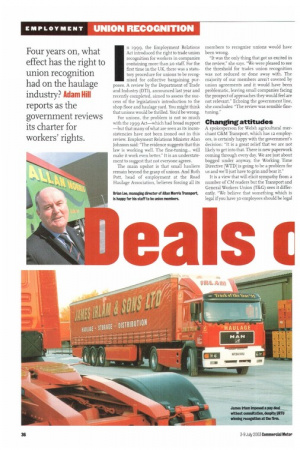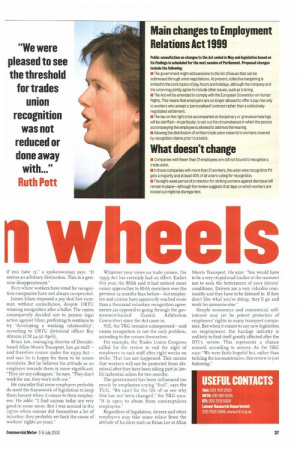'a''
Page 36

Page 37

If you've noticed an error in this article please click here to report it so we can fix it.
e e s
Four years on, what effect has the right to union recognition had on the haulage industry? Adam Hill reports as the government reviews its charter for workers' rights.
Ii 1999, the Employment Relations Act introduced the right to trade union recognition for workers in companies containing more than ao staff. For the first time in the UK, there was a statutory procedure for unions to be recognised for collective bargaining purposes. A review by the Department of Trade and Industry (DTI), announced last year and recently completed, aimed to assess the success of the legislation's introduction to the shop floor and haulage yard. You might think that unions would be thrilled. You'd be wrong.
For unions, the problem is not so much with the 1999 Act—which had broad support —but that many of what are seen as its inconsistencies have not been ironed out in this review. Employment Relations Minister Alan Johnson said: "The evidence suggests that this law is working well. The fine-tuning.., will make it work even better." it is an understatement to suggest that not everyone agrees.
The main upshot is that small hauliers remain beyond the grasp of unions. And Ruth Pott, head of employment at the Road Haulage Association, believes forcing all its members to recognise unions would have been wrong.
"It was the only thing that got us excited in the review," she says. "We were pleased to see the threshold for trades union recognition was not reduced or done away with. The majority of our members aren't covered by union agreements and it would have been problematic, leaving small companies facing the prospect of approaches they would feel are not relevant.' Echoing the government line, she concludes: The review was sensible finetuning."
Changing attitudes
A spokesperson for Welsh agricultural merchant C&M Transport, which has a, employees, is certainly happy with the government's decision: It is a great relief that we are not likely to get into that. There is new paperwork coming through every day. We are just about bogged under anyway, the Working Time Directive [WTDI is going to be a problem for us and we'll just have to grin and bear it."
It is a view that will elicit sympathy from a number of CM readers but the Transport and General Workers Union (T&G) sees it differently. We believe that something which is legal if you have 30 employees should be legal if you have 15, a spokeswoman says. "It seems an arbitrary distinction. This is a genuine disappointment."
Even where workers have voted for recognition companies have not always co-operated.
James Id= imposed a pay deal last summer, without consultation, despite URTU winning recognition after a ballot. The union consequently decided not to pursue legal action against Irlarn, preferring to continue to try "'developing a working relationship", according to URTU divisional officer Roy Abrams ( CM 24-30 April).
Brian Lee, managing director of Dee side. based Allan Morris Transport, has 40 staff and therefore comes under the 1999 Act— and says he is happy for them to be union members. But he believes his attitude as an employer towards them is more significant. "They are my colleagues," he says. "They don't work for me, they work with me."
He concedes that some employers probably do need the framework of legislation to keep them honest when it comes to their employees. He adds: "I find unions today are very good in some areas. But I was around in the 1970s when unions did themselves a lot of injustice; they probably set back the cause of workers' rights zo years." Whatever your views on trade unions, the 1999 Act has certainly had an effect. Earlier this year, the RHA said it had noticed more union approaches to RHA members over the previous 12 months than before—but employers and unions have apparently reached more than a thousand voluntary recognition agreements (as opposed to going through the gov ernment-backed Central Arbitration Committee) since the Act came in.
Still, the T&G remains unimpressed—and union recognition is not the only problem, according to the unions themselves.
For example, the Trades Union Congress called for the review to end the right of employers to sack staff after eight weeks on strike. That has not happened. This means that workers will not be protected from dismissal after they have been taking part in lawful industrial action for two months.
The government has been influenced too much by employers crying "foul", says the TUC. "We can't for the life of us see why this has not been changed," the T&G says. "It is open to abuse from unscrupulous employers."
Regardless of legislation, drivers and other employees may take some solace from the attitude of hauliers such as Brian Lee at Allan
Morris Transport. He says: "You would have to be a very stupid road haulier at the moment not to seek the betterment of your drivers' conditions. Drivers are a very valuable commodity and they have to be listened to, If they don't like what you're doing, they'll go and work for someone else."
Simple economics and commercial selfinterest may yet be potent protectors of employees' rights in many transport companies. But when it comes to any new legislation on employment, the haulage industry is unlikely to find itself greatly affected after the DTI's review. This represents a chance missed, according to unions. As the T&G says: "We were fairly hopeful but, rather than tackling the inconsistencies, this review is just tinkering."




































































































































































